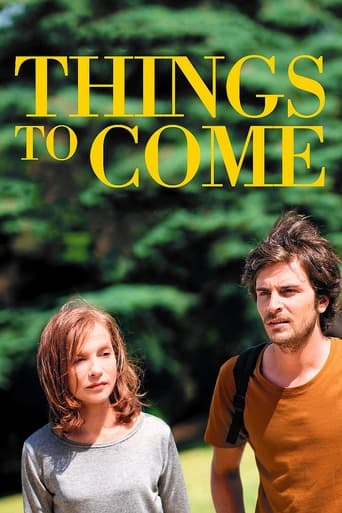

Very well executed
... View MoreHighly Overrated But Still Good
... View MoreBrilliant and touching
... View MoreStrong acting helps the film overcome an uncertain premise and create characters that hold our attention absolutely.
... View MoreThings to Come< is what makes each person's life move on, but it's only when everything happens differently from what was expected it really becomes life.
... View MoreNathalie Chazeaux (Isabelle Huppert) is a philosophy professor although a student strike is challenging the faculty. She is married but her husband reveals his cheating. Worst yet, he has to tell her as he moves out of the house. Her kids are moving on. Her disturbed mother keeps pulling her into her life. Her former student reconnects with her. As each part of her life is severed, she finds life in her new freedom.This is very french especially how Nathalie reacts to her husband's revelation. It doesn't have to be melodramatic but I would like for more drama. The danger is never that high although there is surely some emotional dangers. Huppert's classy acting keeps the movie compelling. I would like to have her disconnecting happen in the first half hour. Instead, it's dragged over an hour and there isn't enough time for her to find herself. It's the shortest of freedom rides. It's understated. I prefer something more dramatic.
... View MoreThe new release "Things to Come" is without question one of the most uninteresting, unengaging, plodding and pointless torture tests of cinematic viewing I will EVER experience in my, or ANY OTHER, lifetime. I get that this is a slice of midlife crisis examination of a woman whose world is catastrophically crashing down all around her. And I have appreciated the great French actress Isabelle Huppert in other star vehicles (e.g., "Home" and "The Piano Teacher"). But as talented as she is, Huppert is hopelessly lost in this pretentious mess centered around philosophy, anarchy and shattered relationships that tries hard, way TOO much so, in fact, to be more important and profound than the film ever manages to realize. And trust me, I kept waiting for any manner of compelling "things to come" to actually come to pass here. And waiting. And waiting. And waiting. And waiting. And...
... View MoreThe Donovan song's tension between seeking an impossible purity and living a deep peace establishes the film's central theme and heroine Isabel's primary virtue. She lives a live of immediate, accepting presence. She won't be tempted by shallow rewards or depressed by disappointments. She embodies the strength and resilience of the examined life. As the Rousseau quote declares, desire is the enemy of happiness. Our failed satisfactions are based upon the desire for something new — which, once achieved, no longer satisfies. Isabel has lived through the political temptations of her time, from her flirtation with communism through the '68 revolution. So she's not tempted by the current students' strike for pensions or her star ex-student Fabien's anarchism. In contrast, her husband stays stuck in the attitudes he held at 18 and has the rigidity and insensitivity to tyrannize his students. Isabel finds real value and fulfilment in teaching philosophy to her high school students, training them to think for themselves and taking an interest in their lives. She has a stoic response to her publishers' initial insistence on jazzing up her textbooks, then suspending their publication altogether. Her integrity won't allow her to abandon her values. She has the dignity and self-respect to accept their abandonment with aplomb. That also sustains her through her husband's abandonment for a younger woman. As briskly as Isabel cuts loose from him she ends her connection to his family's country home where they vacationed every summer and where she planned and cultivated her garden. In all their scenes together she conducts herself with strength and an absolute rejection of self-pity. This self-sufficiency supports her when she visits Fabien's mountain retreat and when her fragile yet demanding mother dies. A scene with an importunate stranger at a cinema shows her refusal to seek carnal reaffirmation. Her grandson's birth shows her instead embracing the role of grandmother, fully and warmly. In the last scene Isabel hosts a Christmas dinner with her children. To let her daughter eat, Isabel goes to tend to the crying baby, stilling him with yet another song. With the family dinner framed out of the shot on the left and Isabel and the infant framed out on the right, the shot focuses on the shelves of books between them. The film is about the use of those books, i.e., the traditional function of philosophy — detached from the fashions of the day in pedagogy or politics — to address the one essential question: How should we live our life? Aptly, the last song is "Unchained Melody," which turns an exultation in freedom into a love song. The Schubert song and the Woody Guthrie ballad both provide imagery of transcending the mundane reality by discovering the ethereal around it. The other characters live to pursue new pleasures, which inevitably fail to satisfy them. The husband's new woman has left him alone for Christmas, apparently not yet ready to introduce him to her family. Fabien and his German friends debate the political uses of anonymity or the collective authorship (i.e., the death of the author or the personal, a recently fashionable fiction). Isabel's daughter has wanted a baby but at the tension between her parents dissolves into tears and needs to hold him again. As if he will give her the stability she lost through her father's infidelity. The preacher similarly cites Isabel's career as a philosophy teacher to be the proper justification for her mother's life of pain, isolation and abandonment. And then there is Pandora. This is the obese, willful, all-black cat that Isabel inherits from her mother, is allergic to and impatient with, and finally leaves at Fabien's retreat. Far from the traditional Pandora, who unleashed the world's evil winds, this one is a minor key replay of Isabel's themes. Pampered by Isabel's mother, Pandora hides from whoever else enters her mistress's flat. She's heavy to carry, like the unwanted burdens we all have periodically thrust upon us. But like Isabel she has a feral intelligence and instinct. This house cat takes off into the forest but has the instincts to survive and find her way home in the morning, bringing her new mistress back a dead mouse. In her instinctual survival and her integrity the cat is another reflection of our wise, warm and worldly philosopher. The film is titled L'Avenir, "the future." Written and directed by a woman, it offers a real rarity: a heroine of intellect, will and strength. That's a refreshing new kind of superhero.
... View More